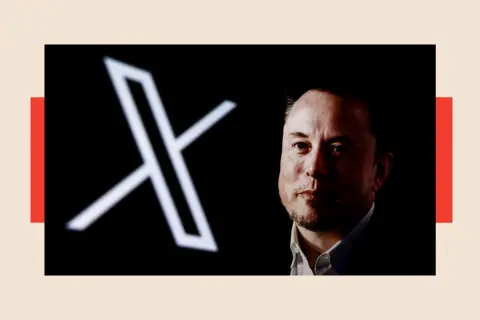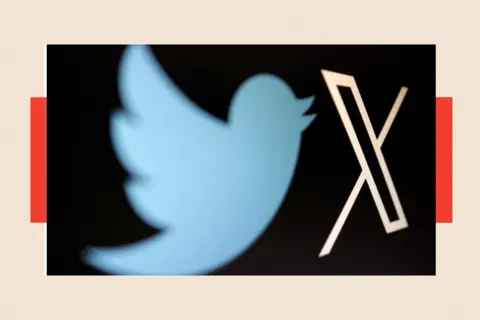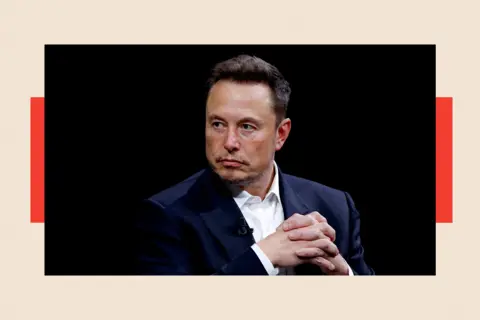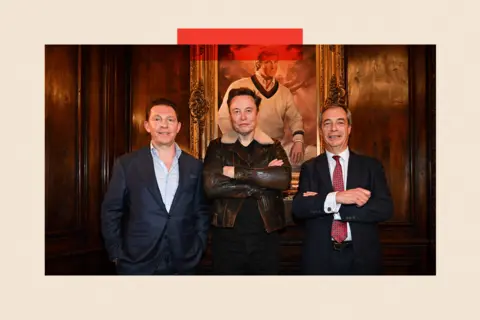 BBC
BBCBillionaire Elon Musk has hailed Twitter as a bastion for freedom of expression ever since he acquired the social media site two years ago. But over the course of 2024, X, as it is now called, has evolved from what felt like a communal town square into a polarised hub where views and posts seem even more controversial.
Certain profiles that have shared misleading takes on politics and the news, some of which have been accused of triggering hate, have recently shot to prominence.
All of this matters because X might not have as many users as some other major social media sites, but it does seem to have a significant impact on political discussions. Not only is it a place where certain high-profile politicians, governments and police forces share statements and views – but now its owner Mr Musk has directly aligned himself with Donald Trump, a relationship that could redefine how the bosses of other social media giants deal with the next US President.
So, what’s behind this new wave of change? Has there been a shift in the demographic of people using X over the last year – or could it be the result of deliberate decisions made by those in charge?
Rise of the Twitter ‘media’
Two months ago, Inevitable West didn’t exist on X. Now the profile, which calls itself a “Defender of Western values and culture”, has amassed 131,600 followers (a number that is rapidly growing). It is racking up around 30 million views each day collectively among all of its posts, according to its creator. Mr Musk has even responded to Inevitable West’s posts on X.
Their recent posts, which often feature news alert-style captions, include a faked video showing Trump telling the British Prime Minister he is going to “invade your country and make Britain Great Again”.
There have also been several posts in support of far-right activist Tommy Robinson, as well as some debunked claims about the farmer’s protests in the UK and a knife attack in Southport, in which three children were killed during a Taylor Swift-themed dance workshop.
 Getty Images
Getty ImagesInevitable West denies accusations of pushing disinformation and inciting abuse or violence. “The purpose of my X account is to be the voice for the silent majority of the Western world,” its creator told me. They refused to share their identity with me when we corresponded, but claim to be “Gen Z” and “not Russian”.
“Uncensored information and opinions will inevitably lead [to] the US and entire West and Europe moving further right, [which is] proven by Donald Trump getting elected and surges in Europe’s far right,” they argued. “Globally, it would mean corrupt politicians and leaders would get found out.”
They appear to see the rise of their account as the “death” of what they would call the “MSM” or Mainstream Media. That’s perhaps no surprise given that, following the US Election, Mr Musk himself told X users: “You are the Media Now”.
From blue ticks to likes: Changes at X
When Mr Musk first acquired Twitter, he emphasised the need to house all political opinions and push back against censorship by social media companies and governments.
Changes – including mass layoffs and alterations to moderation policies on issues like political misinformation – started immediately.
There have also been various alterations to the nature of feeds including the creation of two separate sections: “Following”, which features accounts you follow, and “For You”, which is algorithmically curated, as on TikTok.
 Getty Images
Getty ImagesOver the course of 2024, however, there have been another wave of alterations that appear to have transformed it further. The block function has been changed, meaning that if you block an account you won’t be protected from that profile viewing what you post. Likes, meanwhile, have been made private.
The site still features crowd-sourced community notes used to factcheck or rebuff what posts say – and users are able to pay for blue ticks, which were previously given free of charge as a sign authenticating that the person was who they said they were.
Now, though, it is necessary to pay to subscribe to X Premium to receive a checkmark. (There are three tiers of subscription – in the UK, the Premium Tier currently costs around £10 a month).
Premium profiles are entitled to more privileges and prominence – and can make money from the engagement they get from other checkmarked profiles. From October, X changed its rules so that instead of basing revenue for individual accounts around ads, it now takes into account likes, shares and comments from other Premium accounts.
 Getty Images
Getty ImagesOf course other social media sites allow users to make money from posts and let them share sponsored content – this is not uncommon – but most major sites have rules that allow them to de-monetise or suspend profiles that post misinformation.
X does not have rules to de-monetise accounts over these kinds of posts, although it does allow users to add community notes to misleading or false tweets. And it does not allow “misleading media” like manipulated or synthetic videos that “may result in widespread confusion on public issues, impact public safety or cause serious harm”.
According to Inevitable West, X can now become a job. They told me when they were posting around seven times a day they could accrue a minimum of “$2,500 a month”.
They say they know of another account making “$25,000” each month – that account allegedly has 500,000 followers and posts “roughly 30” times a day.
Has the algorithm changed?
Change can sometimes come about when a website alters the algorithms (or recommendation systems) in some way, for example in order to boost and benefit certain posts. What’s unclear is whether or not that may be the case here?
Certainly, I’ve observed a difference in the variety of posts recommended on the “For You” feed compared with that a year ago.
This is something I analysed through an “Undercover Voter project”, in which I created and ran social media accounts belonging to more than 20 fictional characters, based in the US and UK, which reflect views from across the political spectrum.
These characters have profiles on the main sites including X, allowing me to interrogate what different accounts were recommended on social media. The accounts are private and do not message real people or have friends.
 Getty Images
Getty ImagesRegardless of the different political views their accounts express, I observed that in the last six months of this year their feeds have become dominated by divisive posts, and tend to feature more in support of Trump or in opposition to politicians and people across the world who are not seen to be aligned with the US president elect.
However, all of this seems to be the consequence of the environment and the various changes to the wider site, rather than solely a simple tweak to the algorithm.
Andrew Kaung, who was previously an analyst on user safety at TikTok and has also worked at Meta, has spent years observing how these recommendation systems can be updated and changed. “What we’ve seen on X is not just about algorithms changing, it is also informed by the lack of safety mechanisms in the name of free speech,” he says.
 Getty Images
Getty ImagesNina Jankowicz is former Executive Director on the Disinformation Governance Board of the United States, which was set up in 2022 to advise the Department of Homeland Security on issues including Russian disinformation and later disbanded after public backlash over concerns including around freedom of expression and transparency. She argues that X’s algorithms now “privilege divisive and misleading rhetoric” and suggests that users who post less controversial content have found a reduction in the views.
“The consequence is that the platform that touts itself as a public square is an extraordinarily artificial environment, a true black mirror of the most worrying parts of human nature.”
The unintended influencers
I messaged dozens of other large accounts, who describe the growing influence they’re able to have on the site, often unexpectedly.
“I never really intended to become an influencer,” admits one profile called Andi, who says he’s based in New York. “But I figure since I have this platform I should try to use it to advance my own causes.”
He describes how he shared a meme of squirrel – after learning about a squirrel that was euthanised over concerns it could have rabies – which now has 45 million views. Andi compares his reach to that of popular podcaster Joe Rogan, who has 14.5 million followers on X.
“But I am no Joe Rogan, so it’s really special that something I post can get almost as much viewership.”
Andi and other X accounts I’ve corresponded with believe that the changes to X are a good thing, as they now have a reach they could have never anticipated.
Allegations of moderation bias
Earlier this month, an attack at a German market, which killed five people and injured more than 200, was widely debated on X. Much of the discussion centred around the suspect, a German resident originally from Saudi Arabia. German prosecutors have said the investigation is ongoing, but suggested one potential motive for the attack “could have been disgruntlement with the way Saudi Arabian refugees are treated in Germany”.
Inevitable West was among those who commented: “Raid the mosques. Ban the Quran. Carry out mass deportations. Our patience has officially expired.”
The account has been accused of inflaming hate with posts about issues including immigration and religion. Other users said this could incite violence. But the profile responded by saying that they were “actually inciting safety”.
 Getty Images
Getty ImagesWhen questioned on this, Inevitable West told me that they’d say the same about other religions. Separately, they also said they would never delete their own posts – even when they turn out to be untrue.
Meanwhile, their content is being seen by feeds around the world.
Allegations of bias in moderation methods have long been levelled at Twitter, both before and since Mr Musk acquired the company, alongside questions about whether the site previously limited freedom of expression.
I spoke to Twitter insiders about this for a Panorama investigation which aired in 2023, and they told me that, in their view, the company was going to struggle to protect users from trolling, state-coordinated disinformation and child sexual exploitation, putting this down to, among other things, mass layoffs.
At the time, X did not respond to the points raised. Afterwards, Mr Musk tweeted a BBC article about the Panorama episode with the caption: “Sorry for turning Twitter from nurturing paradise into a place that has… trolls”. He also declared, “trolls are kinda fun”.
Separately, Mr Musk had said he had “no choice” but to reduce the company’s workforce because of financial losses.
Lisa Jennings Young, former head of content design at X who worked there until 2022, says: “I feel like we’re all living through a vast social experiment [on humanity].”
It doesn’t have a specified goal, she says. Instead, in her view, it is “not a controlled social science experiment [but one] we’re all a part of”. No one really knows what the final result could be, she argues.
 Getty Images
Getty ImagesSome X users tell me that they have recently decided to migrate to other social media platforms, including Bluesky, which started in 2019 as an experimental “de-centralised” social media site created by former Twitter boss Jack Dorsey. It now has more than 20 million users.
It is difficult to determine exactly how many real users have chosen to leave X – or indeed if it has grown.
Elon Musk and X did not respond to the points raised in this article, nor to requests for an interview.
 Getty Images
Getty ImagesX says that its priority is to protect and defend the user’s voice and it has guidelines about hate, which say that users “may not target others with abuse or harassment or encourage other people to do so”.
An X spokesperson previously told the BBC: “X has in place a range of policies and features to protect the conversation surrounding elections. We will label content that violates our synthetic and manipulated media policy, and remove accounts engaged in platform manipulation or other serious violations of our rules.”
The site also told the European Commission in November: “[X] strives to be the town square of the internet by promoting and protecting freedom of expression.”
Social media meets political influence
Since the 2024 US presidential election, X has cemented its place as the home of political updates about the new Trump administration.
Mr Musk endorsed Trump as a candidate as far back as July. He has now been offered a government position, leading a new advisory team called the Department of Government Efficiency (Doge).
Sam Freeman, a former Meta employee who now works as an expert in Trust and Safety for a company called Cinder, believes that this will have a broader effect on other social media bosses too. He predicts them “needing to have a more personal relationship with the incoming administration”, particularly if they feel increasing pressure over regulation and online safety.
Mark Zuckerberg, who founded Facebook (now Meta) and has since acquired Instagram, recently had dinner with Trump at his home in Mar-a-Lago.
 Getty Images
Getty ImagesThe President-elect had taken aim at Mr Zuckerberg on previously occasions, accusing his website and others of bias. “Facebook, Google and Twitter, not to mention the Corrupt Media, are sooo on the side of the Radical Left Democrats,” Trump once wrote.
Could the dinner indicate a softening of relations? Certainly it suggests that Mr Zuckerberg considers that being at least somewhat in close proximity to Trump could be in his interest.
So, it seems, does TikTok CEO Shou Zi Chew, who was also reported to have met Trump at Mar-a-Lago as the social media company fights plans by US authorities to ban the app.
The US government claims TikTok’s parent company ByteDance has links to the Chinese state. Both TikTok and ByteDance deny this. The Supreme Court is due to hear legal arguments from TikTok in January.
 Getty Images
Getty ImagesIn the the UK, the Online Safety Act will soon be enforced, under which companies will have to make commitments to the regulator Ofcom about how they will tackle illegal content and posts that are harmful to children. In Australia, politicians have gone a step further and approved plans to ban children under 16 from using social media.
Ultimately though – given how many social media giants are based in the US – it is the approach of the American government and president that could have the greatest impact.
“I see Trump’s feelings towards a platform dictating the way his administration views them,” argues Mr Freeman.
The question that remains is what Trump’s views on this really are – and whether he will demand accountability in a different way from these sites in the future, or not at all.
The ramifications, whichever way it goes, will no doubt be far-reaching.
Top picture credit: Reuters and Getty Images
BBC InDepth is the new home on the website and app for the best analysis and expertise from our top journalists. Under a distinctive new brand, we’ll bring you fresh perspectives that challenge assumptions, and deep reporting on the biggest issues to help you make sense of a complex world. And we’ll be showcasing thought-provoking content from across BBC Sounds and iPlayer too. We’re starting small but thinking big, and we want to know what you think – you can send us your feedback by clicking on the button below.
 topnaijanews Stay informed with the latest Nigerian news at your fingertips
topnaijanews Stay informed with the latest Nigerian news at your fingertips

